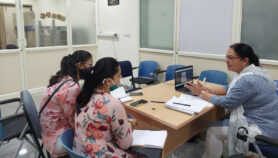By: Mun-Keat Looi
Send to a friend
The details you provide on this page will not be used to send unsolicited email, and will not be sold to a 3rd party. See privacy policy.
A potentially fatal form of malaria is often mistaken for a less serious form of the disease, say researchers in Malaysia. They warn that doctors throughout South-East Asia must be more alert to the problem.
Writing in Clinical Infectious Diseases (15 January), Janet Cox-Singh and colleagues from the University of Sarawak, Malaysia, say patients infected with Plasmodium knowlesi — a form of the malaria parasite commonly found in macaque monkeys — are often mistakenly diagnosed as being infected with P. malariae, a benign form of the disease.
This is because P. knowlesi resembles P. malariae in its later growth stages, says Cox-Singh.
Mosquitoes pass the disease to humans after biting infected monkeys. There is no evidence of human-to-human transmission.
The team used DNA analysis to study over 1,000 blood samples from malaria patients throughout Malaysia. They found that around one in four patients were infected with P. knowlesi — far more than previously thought.
Other studies, conducted using the same techniques in Myanmar and Thailand, have reported similar findings.
Cox-Singh says the huge numbers of other malarial parasites, such as P. vivax, circulating in Malaysia in the past could have masked the presence of P. knowlesi. But with human malaria under control in the region, other strains are now being noticed.
The worry is that P. knowlesi has a higher rate of replication — once every 24 hours — compared to other forms of malaria. Delays in diagnosis and treatment could be fatal.
There is currently no specific diagnostic test for P. knowlesi. The researchers recommend that doctors treat patients diagnosed with P. malariae as potentially having P. knowlesi.
"Adults don’t normally seek treatment for symptoms of P. malariae," Cox-Singh told SciDev.Net. "In the South-East Asia region, particularly for people who have entered forested areas, if [a patient is] sick enough to seek treatment, then P. malariae should be strongly suspected of being P. knowlesi. Treat it rapidly and get rid of it before it gets worse."
"For those dealing with malaria in travellers, these findings should trigger a warning that P. knowlesi infection mimics another species of malaria, but can be much nastier and associated with complications," says Sanjeev Krishna, professor of molecular parasitology and medicine at St George’s, University of London, in the United Kingdom.
"As P. knowlesi can cause severe disease, there is now an excellent opportunity to understand better how severe disease may complicate other malarias."
Link to full paper in Clinical Infectious Diseases
Reference: Clinical Infectious Diseases 46, 165 (2008)
See Letter to the editor.













